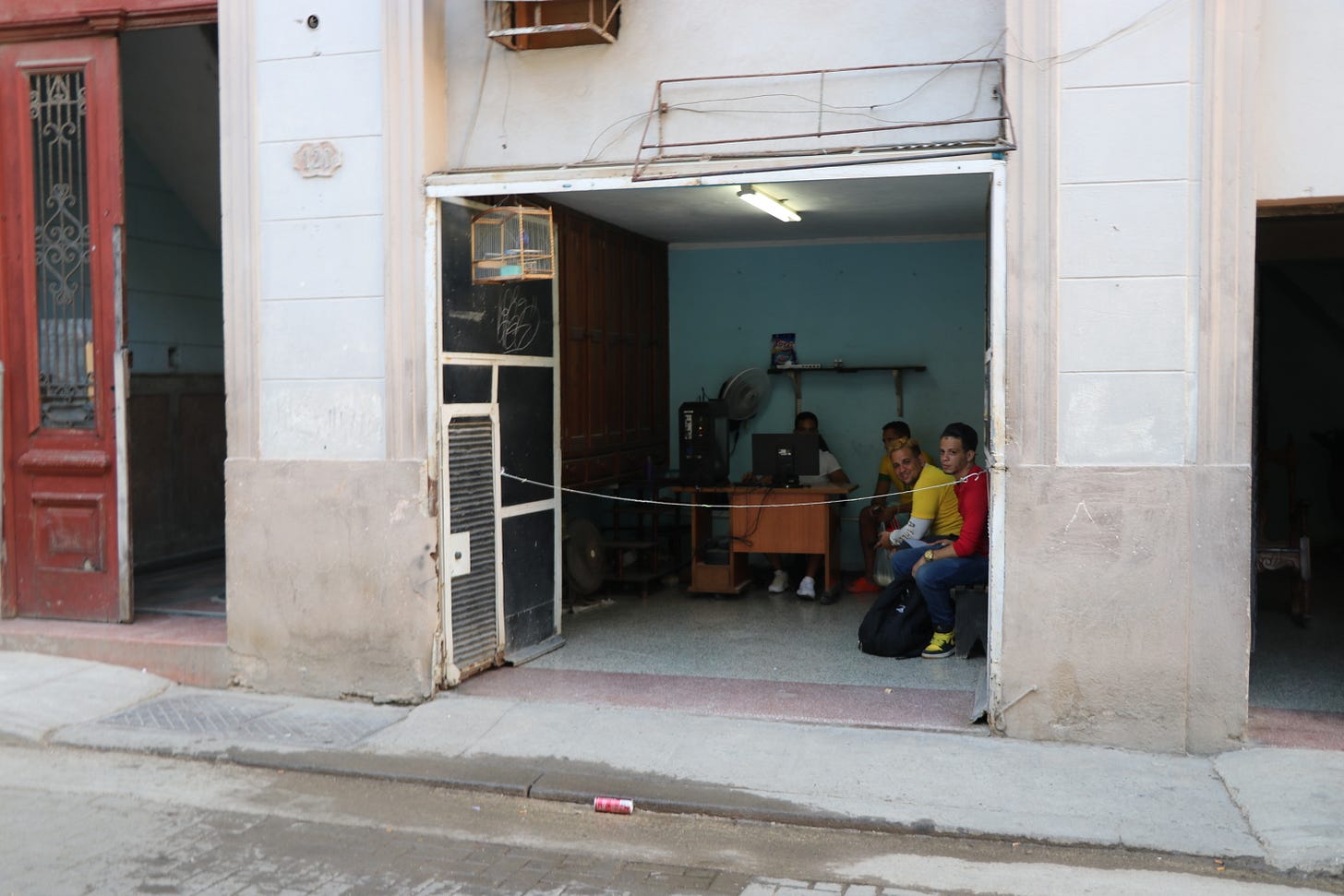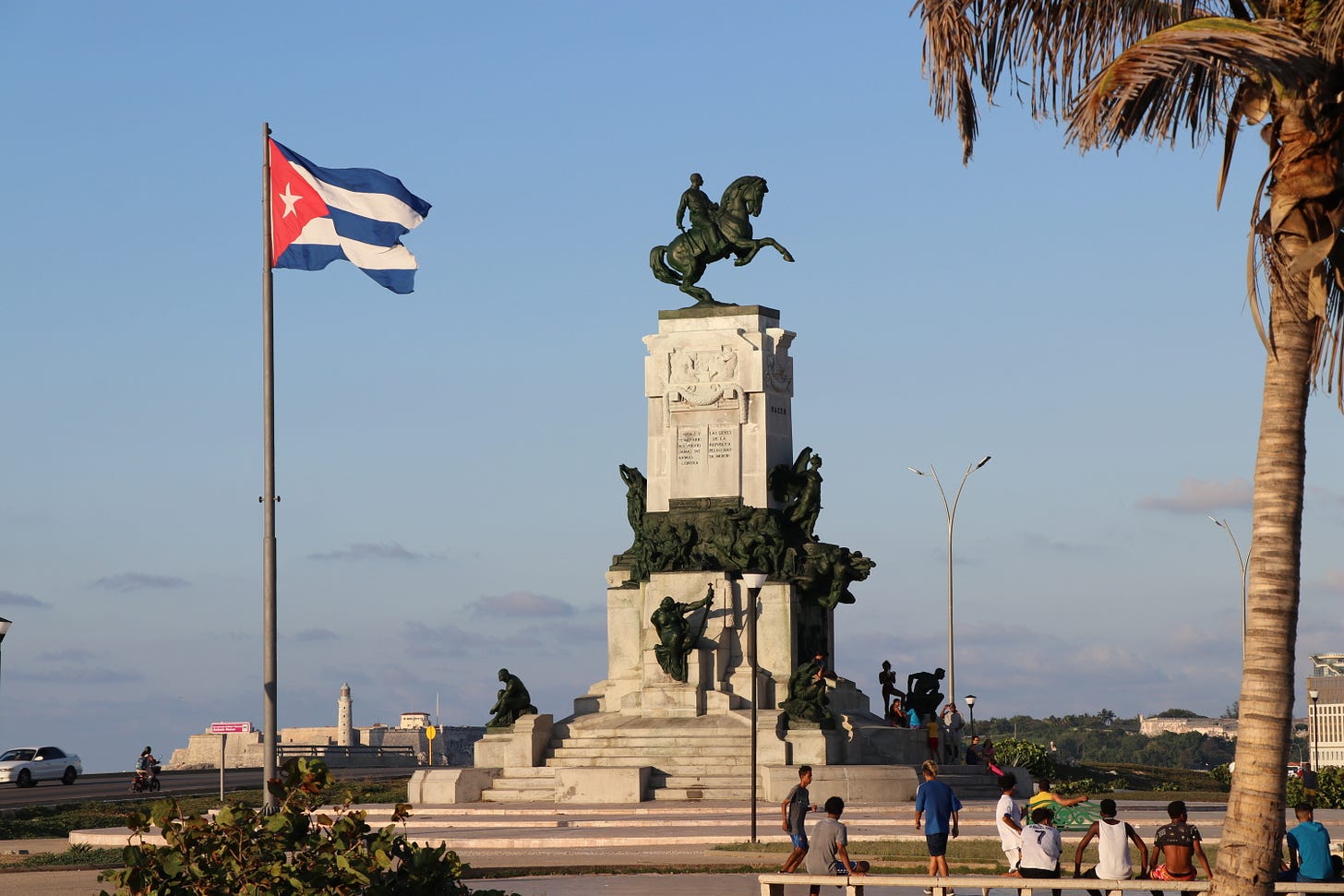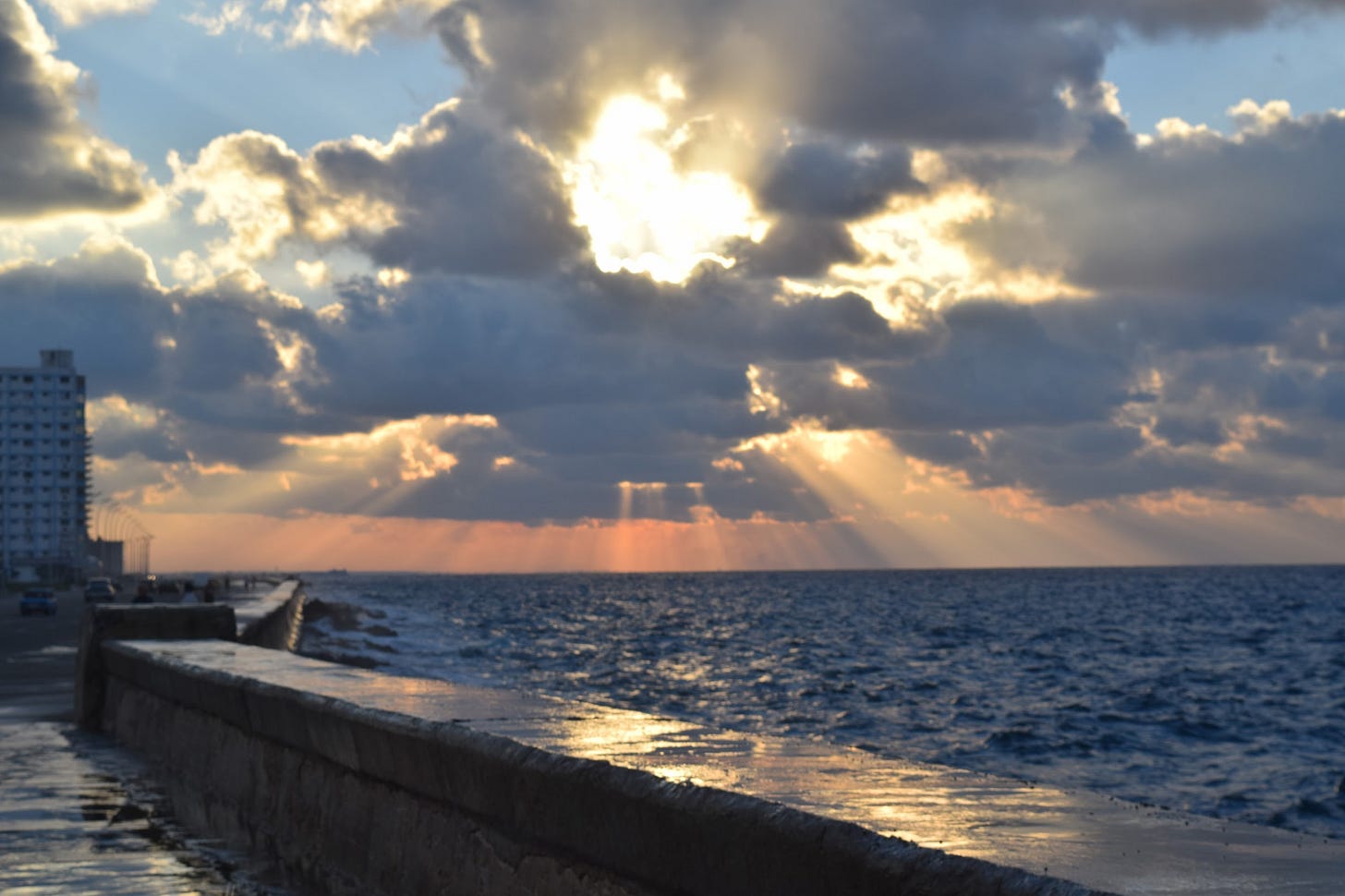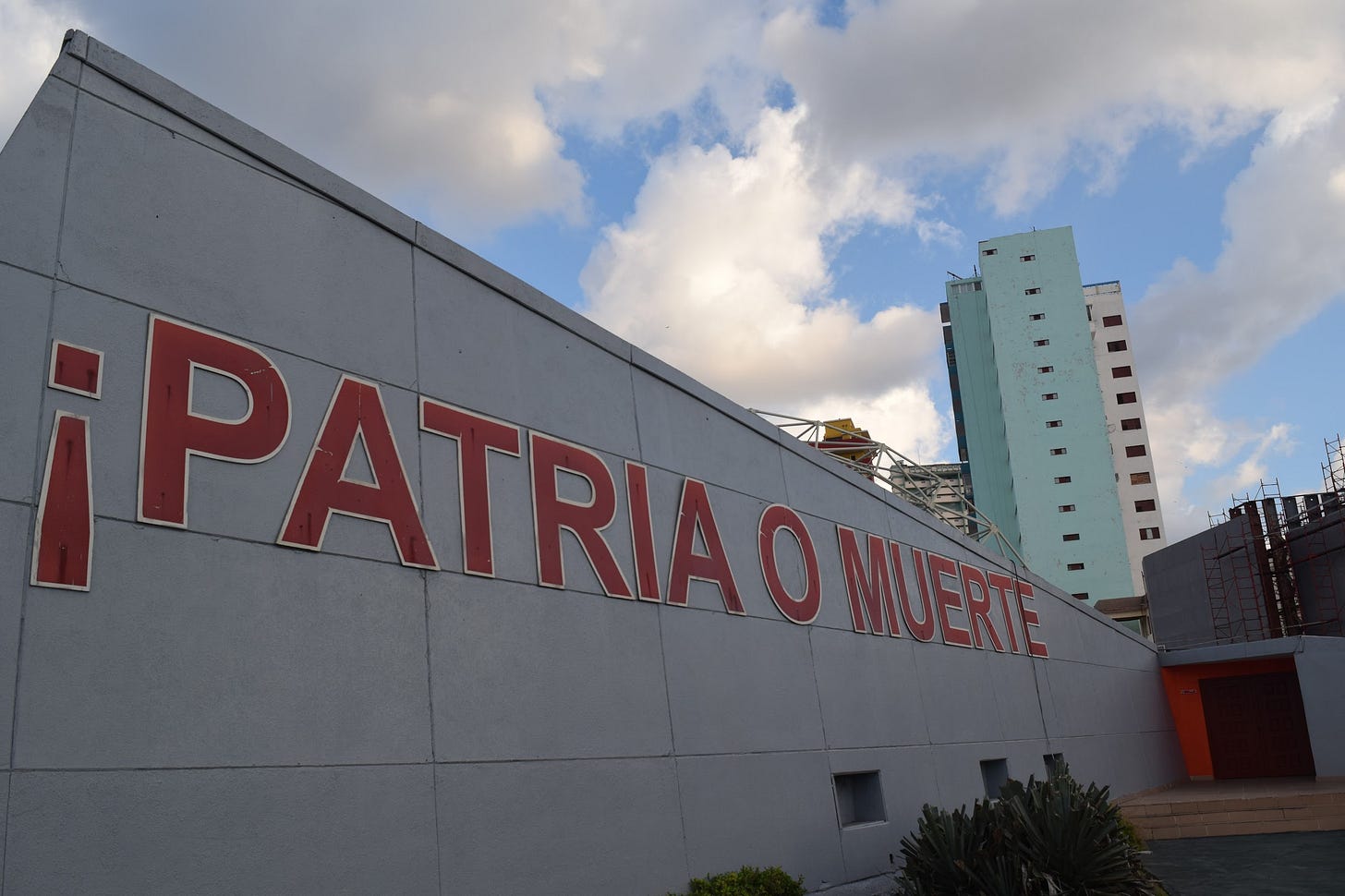The Internet isn't Bringing Revolution to Cuba
At least not yet — and the prospects aren't good
"Yes! Now with the internet, we can see the reality of the world. Before, it was just Cuba. But now we see on the internet, England, France. We think 'What the f***?' People are unhappy."
That was spoken to me by Elizabeth, a waitress in her twenties I met in Havana this May. And when I told a man named Jose later that week that I’d visited Cuba in 2016, he responded, “Oh so you know. Things were much better then."
Both Elizabeth and Jose expressed a sentiment I saw frequently among young people there, a dramatic shift in collective feeling relative to my first visit seven years earlier. Many Cubans seem deeply unhappy with the state of their country — but can this lead to any real change?
I focused a great deal on the lack of internet access on my first Cuba post, but what I left out was the overall sense of vivacity I saw then, a semblance of happiness, despite incredible poverty and constraints on daily life as it is experienced in many other parts of the world.
I saw long lines to access basic services like withdrawing money or purchasing mobile data, and a necessity to scour a variety of neighborhood groceries to find basic food supplies. One morning my casa particular owner even ran out of her home to flag down a man on a horse-drawn carriage to purchase lettuce. (“Casa particulares,” as I mentioned before, are offline Airbnb-like homestays that preceded the introduction of the company to Cuba in 2015.)
But I also saw music in the streets almost everywhere, and people frequently dancing to it — including, often, while waiting in those same long lines to access basic services. I was very rarely asked for money, despite my clear status of wealth as a foreigner visiting Cuba. (Cuba’s median salary at the time was around $20-$30 per month — roughly the same cost as a single night for a tourist in an Airbnb or casa particular.)
Indeed, when I visited in 2016, the government was in the process of greatly expanding access to licenses to run casa particulares and Airbnbs, and many I spoke with then, for this and other reasons, seemed hopeful about the future there.
My recent visit was quite different. Cubans I met seemed, in a nutshell, far more desperate, and far less happy with — or even tolerant of — the situation on the island. So what happened?
Seven Years Later
As I described in my first post, the government-run telecommunications company ETECSA began allowing the purchase of 4G data in 2019. But much more changed than that — the pandemic hit the Cuban economy hard, and US sanctions of the country became, amazingly, even worse than they’d been.
Even though many I met on my first visit expressed an overall sense of optimism about Cuba’s future, this was tempered by a countering sense of dread. Many I spoke with believed President Obama had done a great deal to loosen the strict US embargo on the island — which he did — and feared the incoming President Trump would reverse many of these same decisions — which he also did, almost immediately. President Biden, sadly, has continued most (though not all) of Trump’s Cuba policies.
Though I don’t discuss them much in these posts, it’s important not to understate the role US sanctions play in Cuban hardship. The UN estimated in 2018 that the US embargo on Cuba has cost the Cuban economy a whopping $130bn over the course of nearly sixty years (and it’s now up to sixty-two), and William LeoGrande, professor and former Dean of American University’s School of Public Affairs, has written that the embargo is ‘the oldest and most comprehensive US economic sanctions regime against any country in the world…. [it] has never been effective at achieving its principal purpose: forcing Cuba's revolutionary regime out of power or bending it to Washington's will.”
The US embargo is so prominent in Cuban society that the island even has its own word for it: El Bloqueo, “the blockade.” Note the definite article in this — it’s THE blockade, not just some blockade; it indicates a state of heavy permanence. Like “the war,” say, or “the moon.”
So I’d just like to make clear, despite my focus on the internet in these posts, US policy is not helping Cuba, at all. And it hasn’t been, for the entire time most of us have been alive. We discussed much of this on our podcast with friend and guest expert/wonk Rob Morris over the summer, and Rob discussed the many failings of US sanctions around the world in his podcast too.
First the Internet – and then the Pandemic
Many on the political left in America and Europe seem prone to blame Cuba’s woes almost entirely on US sanctions. And those on the US right, of course, tend to blame the country’s troubles almost entirely on Cuba’s government.
I’d like to encourage us to believe both these things can be true.
The government’s choice to give Cubans a great degree of information freedom in 2019 was consequentially timed. COVID-19 arrived in the world shortly after, and things became significantly worse on the island from there.
The pandemic led to a shortage of foreign currency, food, and medicine in Cuba throughout 2020 and 2021. Foreign investment, aid, and tourism to the island dropped sharply, leading not only to a shortage of money in the economy but also actual foreign currency, of value in itself. Over half the products sold in Cuban stores are imported, and the government requires hard foreign currency to purchase them. The government collapsed the “two currency system” it had used for nearly thirty years at the start of 2021, and many in the tourism industry lost money as a result. And while the government raised salaries during the pandemic, prices rose as well.

On November 27, 2020, activists of the San Isidro Movement, which formed in 2018, protested the government’s censorship of journalism and art outside the country’s Ministry of Culture. They did so at significant risk in a state with little tolerance for dissent: Amnesty International reports that after the protests, the government began placing activists and independent journalists covering the movement “under frightening levels of surveillance,” and under threat of house arrest. The government briefly halted internet access to the entire island then as well.
Six months later, in July 2021, the island broke out in mass protest, the largest in at least thirty years. Thousands were arrested, at least one person was killed, and hundreds of protestors remained in jail or were “disappeared” in the weeks after.
The internet played a pivotal role in expanding the July unrest: the protest began in a town called Santa Clara de los Baños, and quickly spread via social media across the country. The government shut off internet access for days after in response.
“If the internet cuts out when you're talking with a friend, the first thing you wonder is 'Where is the protest now?,” a Havana tour guide named Michael told me. “Cuba is not like China, where they have the technology to control the internet.”
“If the internet cuts out when you're talking with a friend, the first thing you wonder is, ‘Where is the protest now?'"
Like Michael, many I met in Cuba credit the internet to helping fuel protests on the island — but also fueling a sense of despair, and a desire to leave as soon as possible. Elizabeth, the waitress, told me, “I don’t want the same life as my parents.” She said that she’d like to leave, “maybe to Mexico first, and then somewhere else.”
When a friend and I spoke with John as he shared rum with us overlooking the water on Havana’s Malecon, he said he wanted to leave, too. He has a grandfather in Spain, and would like to get a Spanish “red passport” within the year.
So — Can the Internet Lead to Revolution?
In my last post, I asked “Can information lead to revolution?” So, can it?
It’s increasingly clear to me that the internet can lead to dissatisfaction, and even a shared sense of dissent. But it can also lead to despair: a population that just gives up, or chooses to leave. Especially when that dissent leads to disappearances and deaths.
Many I met in Cuba agree that the internet is good, that it has given them more information and power. Uremis, a 40 year-old taxi driver, told me that “information is a right,” and that the internet has changed a great deal on the island. She says that because of the internet, “We know much more about the world, and the world knows much more about Cuba.”
“We know much more about the world, and the world knows much more about Cuba.”
Elizabeth, the waitress, told me because of the internet, “The government has less power over the people. Information is power.”
But all this knowledge doesn’t necessarily mean anything will happen. I asked Elizabeth if she thinks the government will change now that they know people have more power, and are unhappy. She rolled her eyes. “Change anything? No!”
There’s been a long history of romantic thinking that the internet will lead to protest, and then regime change, under autocratic rule. This came especially into vogue during the Arab Spring and WikiLeaks Revolutions a decade ago, and can also be seen in USAID’s funding of ZunZeo, a Twitter-like app that some believed might lead to a citizen uprising in Cuba. But this sense of optimism goes way back to even earlier days in the internet. Critiquing this same optimism, Evgeny Morozov cites a quote from Thomas Friedman’s 1999 book The Lexus and the Olive Tree:
"Put all of this democratization of information together and what it means is that the days when governments could isolate their people from understanding what life was like beyond their borders or even beyond their village are over. Life outside can’t be trashed and made to look worse than it is…On the Internet people are … uploading and downloading ideologies. In a few years, every citizen of the world will be able to comparison shop between his country and his own government and the one next door".
The thing is, I actually mostly agree with Friedman here. But it does seem the hope then was that all this “comparison shopping” might lead to “every citizen of the world” voting (or revoluting?) in a new government if they don’t like theirs. And what the past several decades of global internet expansion have instead borne out, is that most citizens just end up moving away to a different “store”, or grumbling through the one they’ve got.
As we can see in Cuba, the internet (and of course, sanctions, the pandemic, a poor economy and more) can certainly lead to dissent, which can lead to protest. But that dissent and protest can only go so far as the government allows them. Even if the internet helps spread protests and unite protesters, a firm government hand can just shut it down for a while, as Cuba’s did in 2021. And then the protesters go to jail, and the rest of the population, quite rationally, either keeps quiet, or leaves.
The Part Where I Wear My Foreign Policy Hat
It’s large and looks a bit silly, but bear with me.
What’s amazing is that some seem to still believe the internet can work to help overturn governments. Marco Rubio, for one, pushed Biden to increase internet access to Cuba following the July 2021 protests, but he demanded increased Cuba sanctions at the same time.
This might seem unusual — why help the Cubans with one hand, while punishing them with the other? But it aligns well with a worldview that both the internet and sanctions can help weaken, and perhaps overthrow, the Cuban government.
But recent research has shown that sanctions don’t work (and that they cause tremendous levels of harm to ordinary people.) And I hope I’ve shown here that the internet doesn’t tend to “work,” in the sense of bringing down governments, either.
In fact it seems both these things — expanding internet under an autocratic regime, and enforcing sanctions on it — interact in much the same way, at least vis-a-vis citizens’ relationship with that government:
Internet / sanctions may increase civil discontent and unrest — in the case of the internet because of increased information, and in the case of sanctions because of decreased standards of living.
This civil discontent and unrest is almost always quashed by the regimes that those (like Marco Rubio) promoting the internet / sanctions hope they’ll change.
Instead of meaningful change, the government stays in power, and the underlying population simply learns to live under them again, or leave.
As policy friend Rob Morris points out on his Cuba episode with co-host Rauri, the best way for the US government to change the shape of Cuba’s would almost surely be to end the embargo. A decade or so of sweet, sweet capitalism, and it’s unlikely the Cuban economy would look very “communist” at all. I just spent a month in “communist” Vietnam, and it sure was hard to tell which part of the economy was very different from that of most other countries around the world. And “communist” China, of course, feels much the same.
If we should have learned anything from the sixty-two years of US embargo against Cuba, it’s that it’s not working to make the Cuban government any better. (62 years! The embargo would almost be old enough to retire if it were a human — and pardon the pun, but maybe we should let it retire early.)
The “internet/embargoes will lead to protest and then regime change” causal theory hinges on the premise that the countries in question function like democracies. And of course they don’t — that’s one of the big reasons they get embargoed, or have foreign governments hoping to expand internet there in the first place!
But authoritarians are gonna authoritate, and in the last several decades (at least) there’s been incredibly scant evidence that either embargoes, nor the internet, can effectively change that.
The US embargo against Cuba persists because there’s political support for it, so it can’t hurt to tell your representative that you want to see it lifted. Most of this support seems to come from Florida, so if you live in Florida, definitely tell your representative you’d like to see the embargo lifted. And maybe some day soon we can finally retire it.
Song of the Week: Yotuel , Gente de Zona, Decemer Bueno, Maykel Osorbo, El Funky — “Patria y Vida”. The song pays tribute to the San Isidro Movement, and according to Wikipedia and BBC, it residents of Havana’s San Isidro neighborhood (namesake of the activist group) sang it and chanted anti-government slogans as they prevented the arrest of Maykel Osorbo, one of the song’s creators.








